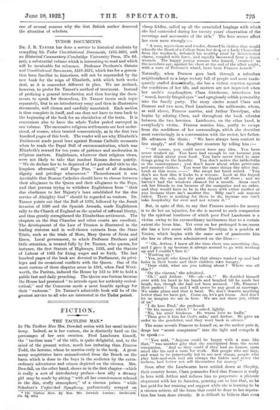TUDOR DOCUMENTS.
Dn. J. R. TANNER has done a service to historical students by compiling his Tudor Constitutional Documents, 1485-1603, with an Historical Commentary (Cambridge University Press, 37s. 6d. net), a substantial volume which is interesting to read and which will be invaluable for reference. Professor Prothero's Statutes and Constitutional Documents, 1558-1625, which has for a genera. tion been familiar to historians, will not be superseded by the new book for the reign of Elizabeth, with which both works deal, as it is somewhat different in plan. We are inclined, however, to prefer Dr. Tanner's method of treatment. Instead of prefixing a general introduction and then leaving the docu- ments to speak for themselves, Dr. Tanner treats each topic separately, first in an introductory essay and then in illustrative documents, well chosen and carefully annotated. Each section is thus complete in itself, and one does not have to turn back to the beginning of the book for an elucidation of the texts. It is convenient also to have the whole Tudor period surveyed in one volume. The successive religious settlements are best under- stood, of course, when treated consecutively, as in the first two hundred pages of this book. The reader will see why Elizabeth's Parliament made penal laws against Roman Catholic recusants when he reads the Papal Bull of excommunication, which was Elizabeth's reward for ten years of patience and moderation in religious matters. Englishmen, whatever their religious views, were not likely to take that insolent Roman decree quietly. " We do declare her to be deprived of her pretended title to the kingdom aforesaid," said Pope Pius, " and of all dominion, dignity and privilege whatsoever." Thenceforward it was inevitable that Roman Catholics should have to choose between their allegiance to the Queen and their allegiance to the Pope, and that persons trying to withdraw Englishmen from " their due obedience to her Majesty's laws established for the due service of Almighty God " should be regarded as traitors. Dr. Tanner points out that the Bull of 1570, followed by the Jesuit invasion of 1580 and the Spanish Armada, made Englishmen rally to the Church of England as the symbol of national liberty, and thus greatly strengthened the Elizabethan settlement. The chapters on the Star Chamber and other courts are excellent. The development of the Law of Treason is illustrated in the leading statutes and in well-chosen extracts from the State Trials, such as the trials of More, Mary Queen of Scots and Essex. Local government, to which Professor Prothero paid little attention, is treated fully by Dr. Tanner, who quotes, for instance, the first Statute of Highways, 1555, and the Statute of Labour of 1563 for fixing wages and so forth. The last hundred pages of the book are devoted to Parliament, its privi- leges and its occasional conflicts with the Queen. One of the most curious of these disputes arose in 1581, when Paul Went- worth, the Puritan, induced the House by 115 to 100 to hold a public fast and daily preaching. The Queen was furious because the House had presumed " to intrude upon her authority ecclesi- astical," and the Commons made a most humble apology for their " rashness." Dr. Tanner's admirable book will be of the greatest service to all who are interested in the Tudor period.


































 Previous page
Previous page